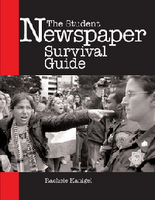
Awards bring prestige to your publication, motivate your staff and help graduates land jobs. Follow these tips to turn your student newspaper into an award-winning publication.
1. Train. Train. Train. Training is essential. If your paper doesn't already have a comprehensive training program, create one. And if you already train your staff, add more training. Make sure training includes all aspects of the publication – design, photography, online, writing, reporting, and editing.
2. Learn from the pros. Invite professionals from the local media as well as graphic design, photography, and writing teachers on campus to lead sessions. Incorporate team-building and leadership-training exercises.
3. Set up a beat system. Most newspapers assign reporters to cover certain topic areas. Beat coverage assures you're covering your campus thoroughly and helps reporters come up with focused story ideas. Traditional campus beats include:
• Student government
• Campus police
• Transportation and parking
• Sports
• Arts & entertainment
• College administration
• Academic departments
But consider other beats, too, such as:
* Shelter – on-campus housing, off-campus housing, living with parents, roommates, rent laws
* Health and fitness – health crazes, diets, gym facilities, health insurance, health center
* Science and environment – environmental issues on campus, scientific research, environmental groups
* Alcohol, smoking and drugs – trends, smoking policies, drug policies, drinking laws
* Religion – religious observances and holidays, religious groups on campus
* Diversity – racial/ethnic issues and conflicts, disability resources on campus
* Sex and relationships – trend stories, studies on sexuality, sexually transmitted diseases
4. Network with the pros. Get to know professional reporters covering your college or university. Although it may be a little uncomfortable reaching out to your direct competitor, professionals at non-competing papers may be happy to share information about how to cover your college or higher education in general. Join professional groups of reporters, editors and photographers. Groups like Investigative Reporters and Editors (IRE), Society of Professional Journalists (SPJ), American Society of Copy Editors and some local press clubs welcome students, and professional members are often happy to give advice. These groups often have reduced-price memberships for students and some sponsor conferences, workshops, listservs and other events or services that could help you. Getting involved in such organizations can also provide good contacts for lining up internships and jobs down the line.
5. Beef up your Web site. Many college Web sites don't take advantage of their online product, (making online awards easier to win!) In addition to posting Web-exclusive content you should also use the site to publish documents related to your stories and photo galleries of images that couldn't fit in your paper. Invite readers to comment on stories – and make it easy for them to do so. Provide helpful links to Web sites that will enhance your stories.
6. Make use of new technology, particularly on the Web. Try podcasting, blogging, multimedia slide shows, video and other new and emerging technologies and storytelling forms, which will set your publication apart.
7. Undertake a redesign. If your paper is looking tired, give it a new look. Check out http://collegefrontpage.com for ideas about what other college papers are doing with design. Other good sites for design tips:
• http://www.ronreason.com/
• http://www.snd.org/
• http://www.newsdesigner.com/blog/
• http://www.newspagedesigner.com/
8. Take a stand. Editorials, reviews, columns, and other opinion pieces are designed to state opinions and judges have respect for bold, well-argued opinions. Be fair and tasteful, respecting your sources and your readers, but don't be timid. Back up your stance with facts to create a cogent and compelling argument.
9. Take on projects. Go beyond day-to-day coverage with special projects, series, special sections, recurring features. These are the kinds of enterprise stories that win awards.
10. Package stories well. When you've got a project or special story, give it a smart package with display type, graphics, sidebars and a logo that sets it apart.
11. Set up an investigative team. Investigative stories bring attention to your publication. Send the team to an Investigative Reporters and Editors, Inc. conference for training, ideas and inspiration.
12. Plan to compete. At the beginning of each term get or make a list of the major competitions and deadlines. Write the deadlines on your calendar. Assign an individual or team to prepare entries.
13. Announce competitions to the staff at least a month in advance. That gives people time to compile entries and fill out forms. Don't leave this to the last minute -- postmark deadlines are usually strict!
14. Encourage specialty reporting. Many organizations, such as the Religion Newswriters Association, offer awards for reporting in specialty areas.
15. Award yourself. Don't wait for outside world to give you recognition. Honor your own staff. And don't just have awards at the end of the semester. Editors or advisers should set up a weekly awards system to recognize great work and boost staff morale. Pass out certificates and/or small gifts – candy, perhaps, or mugs, T-shirts, pens or other stuff with your newspaper's logo.
"15 Ways to Build an Award-Winning Newspaper" is adapted from The Student Newspaper Survival Guide by Rachele Kanigel. Click here to order the book.


No comments:
Post a Comment